Commemorating Native American Culture
Honoring the Past, Present and Future
“Our history is a living history that has throbbed, withstood and survived many centuries of sacrifice. Now it comes forward again with strength…” —Rigoberta Menchú Tum
Summer traditionally marks a season ripe for social gatherings and commemorating milestones.
This year is no exception, and in fact is particularly significant for Native American culture in our area.
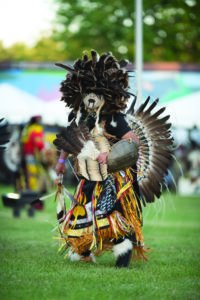
Oneida Nation – DK Images
Each tribe’s story varies and is marked with strife. It’s all of those things—but ultimately their survival—that Oneida Nation’s Bicentennial is honoring this July.
“There’s the good and the not so good that have happened to our people. And so when we look at the event, we use the word commemoration because some of it wasn’t good, but yet at the same time you’re like, hey, we’re still here!
“I couldn’t be more proud to be a part of this event. Our tribe is very blessed that we’re able to do something like this and to provide it at no cost to people in the community.”
Originally from upstate New York, the Oneidas lost nearly 5 million acres of original homelands after the Revolutionary War. In 1838, the Treaty with the Oneida established the 65,400-acre Oneida Indian Reservation along Duck Creek in Green Bay.
“There’s this kind of cool speckled history of native tribes and having to survive and not become extinct,” Michelle Danforth Anderson, Oneida Nation Marketing and Tourism Director, says. “Whether it’s from disease or completely being assimilated. If there’s one phrase to learn for us it’s ‘Ní onayote’a-ka: I am Oneida.’
The weeklong commemoration marks the tribe’s arrival in Northeastern Wisconsin from what is now New York state 200 years ago. It’s happening July 25 through July 29 in 2023, but the exact past dates are fuzzy.
“We’ve been searching through lots of different historical documents—somebody had to have written something because that’s what they did in the past… but we can’t find it!” Danforth Anderson exclaims.
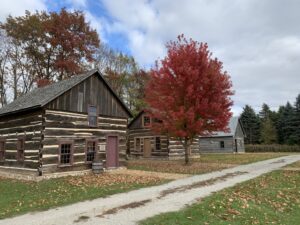
Oneida Nation – DK Images
However, another more emblematic example of communication was found dated July 20 of 1823, surrounding the Oneidas disappointment in what was promised of the area versus what was delivered.
“It was kind of like false advertising,” Danforth Anderson says. “They talked about how things weren’t as they were pitched to them.”
There are currently approximately 17,000 Oneida people from Wisconsin in the world. Oneida Nation of Wisconsin continues to work to tell their story, as well as connect with this and future generations.
“The theme of our Bicentennial is Honoring those of the Past, Present and Future. Everything that we do that week is completely free… we don’t want any barriers for anybody to attend. Any event where you can share your history, culture and hang out is so important because it just breaks down barriers.”
The event will encapsulate Oneida traditions, art, educational presentations, food vendors, workshops and more. To open the “ceremony” is tobacco burning, used as a ceremonial gesture and spiritual expression of thanksgiving.
“Burning tobacco is a common practice shared by many Nations across North America (aka Turtle Island to many Indigenous Nations) during many types of ceremonies,” Garth Webster, Kalihwisaks-Creative Services, says. “It’s not used for consumption and/or inhaling but rather, in this case, the smoke, after tobacco is placed on a fire, carries thoughts of thanksgiving and prayers to the spirit world and the Creator.”
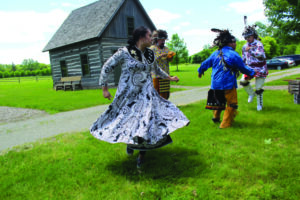
Oneida Nation – DK Images
Oneida Nation’s thanksgiving address tradition is used to begin in all things the tribe is involved with–like meetings and events. Danforth Anderson explains its significance as simple but all-encompassing.
“It is essentially the start of anything that we do… it’s really about giving thanks to all the things that sustain us from Mother Earth to the people, to the three sisters to the grasses to the, you know, the plants, the strawberries, the tobacco, the trees.”
Native American culture places a strong emphasis on its connection with its elders.
“We are starting off the week with an Elders Delegates Breakfast,” Danforth Anderson says. “If our elders didn’t survive before us and do all the hard work that they did to get the bingo going and the casino going… then all of these people that have followed behind them, I mean we are so blessed.
“We put a lot of money back into an education fund. We put money back into our health care system, our behavioral health care system, the school system. We put a lot of money back into foundational pieces for tribal members.
“The other piece of it is that we’re all part of one community… Northeastern Wisconsin… you have to keep making your community better and better.”
One of the ways Oneida continues to do so is by adhering to one of their core values: protecting “Mother Earth.” They are specifically mindful of cherishing that which gives us life.
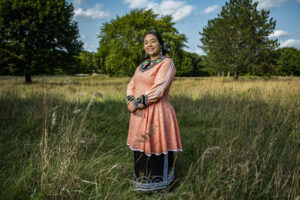
Oneida Nation – DK Images
“I need to value the air that I breathe in. I need to value the water that I drink. I need to value the water that feeds the animals that I might eat, the water that feeds the plants that we ultimately consume,” Danforth Anderson explains. “We have restored a number of wetlands and the purpose of the wetlands is to clean the water, ultimately. The amazing thing is that they’ve done so many good things to farming practices and just basically the restoration of land that’s been over-farmed.”
Bicentennial events will be offered at Oneida Nation’s Amelia Cornelius Culture Park where there are reconstructed log homes and a lifesize long house. Art classes, vendors and demonstrations will take place as well as tours of the traditional homes.
Also included are traditional dancing, kids’ events, a car show, music, food vendors and fireworks.
“If this is one of those memories that you can make and you can remember for a lifetime, then I’ve done my job. It’s all worth it.”
For detailed information about the upcoming Bicentennial and Oneida Nation culture, visit www.ExploreOneida.com
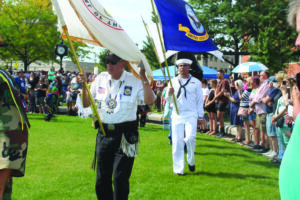
Dennis Kenote and Kanapaen Dixon, 2022 Inter-Tribal Pow Wow
2023 also marks Neenah’s Sesquicentennial (150 years), in which their Sixth Annual Inter-Tribal Pow Wow will be held on September 16 at Shattuck Park in Neenah.
In conjunction with the Neenah and Menasha Historical Societies, Cathy Caldwell, wife of the late Alan Caldwell who can be credited for helping to pass Act 31 requiring students to learn about Native American history in school—is coordinating the event.
Caldwell, herself a member of the Stockbridge-Munsee tribe, has been a part of the event since its inception.
“We moved to Neenah in 2014… Alan went to a talk about Wisconsin Indian history and decided he wanted to make it about education… so he came up with this idea of pow-wow. It wasn’t going to be a ‘normal’ pow-wow, he wanted to have a very knowledgeable emcee who would talk about the history between dances.”
The first pow-wow was a success, but sadly Alan passed away three months later.
“I felt like I really did want to continue this legacy, I guess for him and his honor,” Caldwell explains. “Because of COVID, this will be the 6th annual. We try really hard to keep it in the tradition of being an educational event so each year we try to do a little something different.”
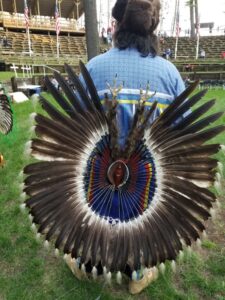
Oneida Nation – DK Images
One of the reasons Caldwell keeps educating at the forefront is personal.
“There are all kinds of misperceptions and misconceptions and stereotypes. My daughter came home from school, she was probably in first grade, and was sad,” she remembers. “She said they were talking in class about where we come from and our ancestors and I said I was an Indian and they told me I was lying.
“The Inter-Tribal Pow-Wow event is for everybody… we’re not representing any one tribe in this pow-wow… we have drum groups from different tribes… our dancers come from all different tribes too.”
The afternoon event—rare for a pow-wow, Caldwell says, as they are typically a full weekend—includes food vendors, arts and crafts, and happens after the farmers market but will include the same Native American music throughout the whole day.
“This year it’s my brother, Clinton Miller. He’s from the Stockbridge-Munsee tribe. We wanted to have more of an ambiance with traditional music, but contemporary. He uses drums, flutes.”
Caldwell says the significance of the pow-wow has always been for people to come together, and at the Inter-Tribal Pow-Wow it also symbolizes inclusion, education and coming together.
“It was a time for the people to get together and celebrate,” she says. “They’re social gatherings. To see all of the amazing dancers from around the country is amazing. It’s beautiful to see. There’s a joy in it.”

Brigetta Miller, co-advisor, Lawrence University Native Alliance
Empowerment and Support for Indigenous Students: A Q&A with Lawrence University Native American Organization (LUNA)’s Brigetta Miller
Brigetta Miller, Associate Professor of Music Education is a member of the Stockbridge-Munsee (Mohican) Nation and a descendant of the Menominee. She currently teaches coursework in both Music Education and Ethnic Studies. Her research interests focus on contemporary issues facing Native American communities today, with an emphasis on decolonizing learning spaces through the lens of Indigenous knowledge systems and pedagogy in education. The enthusiasm she brings from her lived experience of growing up on a reservation, with grandparents rooted in both the Mohican and Menominee tribal communities, informs the unique curriculum she offers her students. She received the 2022 Award for Excellence in Teaching, among the highest honors given at Lawrence. The award citation states, “she embodies the promise of Lawrence University as a place that uniquely values the arts, liberal arts, diversity, and inclusion.”
“LUNA is a student organization focused on empowering and supporting Indigenous students to successfully navigate the college experience,” she explains. “The group is open to all Native American students plus any other students interested in supporting Indigenous initiatives as allies on campus.
“In addition to providing a space that supports and encourages Native American students in their educational goals, LUNA’s mission also includes educating others about Native American culture and raising visibility to key issues facing contemporary Indigenous communities today. Raising visibility about Native culture and increasing representation on the Lawrence University campus are two topics that continue to be especially important to this group. The group meets weekly in the Diversity and Intercultural Center on campus.”
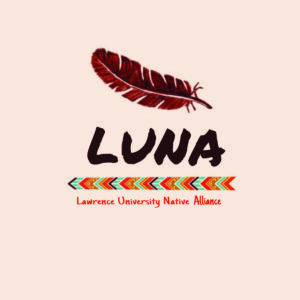
How long has LUNA been active at Lawrence?
“LUNA was founded in 2008 by a Navajo (Diné) student named Breanna Skeets pursuing a Geology degree. She wanted to create a student organization recognized by the university that offered a space for Native American students and their allies to connect/support each other while at Lawrence. During the fall of 2022 she was invited to serve as the first ever Native American Board of Trustee member in Lawrence University’s 175-year history. At the time Breanna was the only Native American student on campus and I was the only Native American faculty member. She invited me to serve as the faculty advisor for the group and I continue to be honored to serve in this role. This year we were extremely fortunate to add a new Lawrence University staff member, Jessica Quintana (Oneida), as a co-advisor to the group.” Jessica currently serves as the Assistant Director for the university’s Diversity and Intercultural Center.”
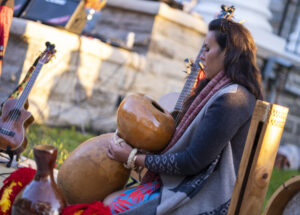
Indigenous Peoples’ Day Celebration on Main Hall Green Oct. 10, 2022. Photo by Danny Damiani
What types of events do you hold?
“Our largest annual event is our Indigenous People’s Day Celebration. This event is free and open to the public. The event is held on the first Monday in October. Many cities and states around the United States are choosing to replace the celebration of Columbus Day with Indigenous Peoples’ Day. The United States legislature now has a bill in Congress to consider naming it a federal holiday.
“The other annual event LUNA sponsors is MMIW (Missing and Murdered Indigenous Women). MMIW is a national movement to help raise awareness about the epidemic of missing and endangered Indigenous women in Canada and the United States. In the United States, Native American women are more than twice as likely to experience violence than any other demographic. May 5 is a national day of awareness for this important issue which helps raise visibility about the violence against Indigenous women that has historically been underreported and invisible from national media.”
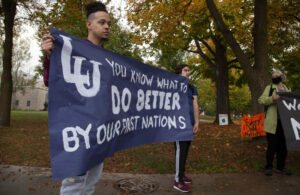
Students hold signs before the Kaeyes Mamaceqtawuk Plaza and Otāēciah sculpture dedication at Lawrence University’s 6th Annual Indigenous Peoples’ Day Celebration Monday, Oct. 11, 2021. Photo by Danny Damiani
What else should we know about LUNA and its presence in the community?
“LUNA continues to have a very collaborative mission and spirit. Mentoring LUNA leaders continues to be incredibly meaningful work for me—a way of paying it forward and giving back to our Native American communities. I am extremely proud of the LUNA alumni who are modeling such a huge force for good in the world by sharing their Indigenous leadership with others. There is a positive rippling effect that we hope will have a lasting rippling effect for generations.”










Leave a Comment